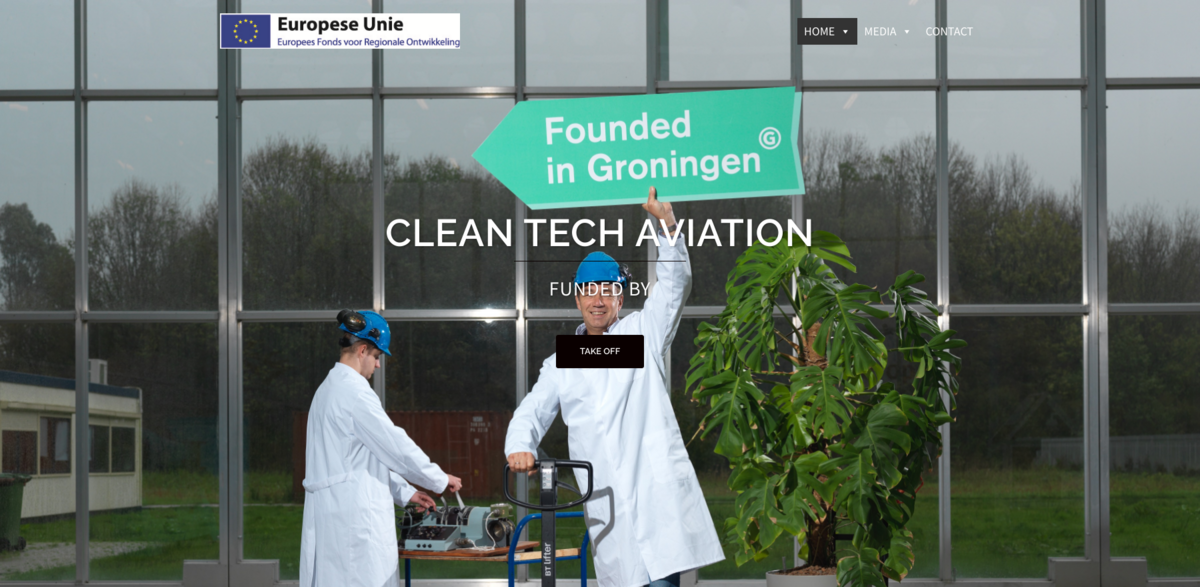What the Project Is
Clean Tech Aviation (CTA) is a Research and Development Organization that contains knowledge and experiences in Aviation and the Maritime industry… CTA consists of two companies: CTA BV and CTA GmbH. CTA BV is located on Airport Teuge, with the engine duration test lab on the Energy Transition Centre (EnTranCe) in Groningen, and CTA GmbH is positioned on Airport Braunschweig in Niedersachsen, Germany. This group is under development of a disruptive technical innovation that will not only save fuel costs for the Aviation and Maritime industry but also deliver a substantial reduction in CO2 and NOx, with no SOX in the atmosphere. Founded by former Air Force Officer and KLM Head of Training, Ben Cappelle, CTA has built a consortium with a professional aviation industry and Science Institutes that together are fully capable of delivering a real solution to climate change while saving costs for aircraft owners.
Main Benefit
The benefits of the project are both clear and compelling. Below is a bullet list summarizing the key figures and facts that underscore the impact of the innovation:
- Fuel cost reduction through retrofitting existing aviation piston and turbine engines and fuel tanks
- Efficiency improvements in the range of 35%
- Substantial CO2 reduction ranging from 25% to 88%
- 98% lower NOx emissions
- Zero SOX exhaust pollution
- Application of LNG Fuel tank design with gasifier use of LNG and potential for cryogenic energy injection in a second stage
Addressing Industry Challenges
The aviation sector is in constant flux, facing rapid changes that call for innovative strategies, tactics, and instruments to maintain a healthy and alive planet. With a surge in both passengers and cargo demands leading to ever-increasing air activities, there is an equally burgeoning requirement for new fuel distributions, airport infrastructure, and pilot availability. Yet, the current systems dealing with fuel availability and distribution create instability, especially when unpredictability in fuel prices sets the market off-kilter. Not to mention, fuel costs may account for up to 70% of operating expenses and the industry’s margins have long been under pressure. This scenario demands a transformative solution capable of tackling these challenges head-on… and that is precisely what CTA aims to deliver.
Globalization Impact on Transportation
The effects of globalizations on world air transport are unmistakable. The industry of General and Business and Transport Aviation has largely been overlooked regarding green flight requirements. Many aircraft continue to operate on upgraded fossil fuels that still contain gasoline fuel with lead, along with fossil diesel and kerosene. The cumulative effects of these fuels contribute significantly to the global issues of air pollution and global warming. The international consortium established by CTA brings together certified skills and abilities from across borders to develop innovative solutions that not only enhance performance but also drastically reduce environmental footprints.
Innovation in Maritime Applications
The approach taken by CTA extends beyond aviation into the maritime arena. The company is focused on designing and developing a hybrid APU engine primarily for inland shipping vessels. This engine works on LNG, supplying electricity power to onboard electro engines, thereby greatly reducing operational costs and fuel-related emissions. The maritime innovation mirrors the concept developed for aviation; both facets of the project aim to achieve a cleaner and better future for their respective industries, saving costs for owners while contributing to a significant ecological benefit.
Project Impact
- SDG 7: Affordable and Clean Energy
- SDG 9: Industry, Innovation, and Infrastructure
- SDG 11: Sustainable Cities and Communities
- SDG 13: Climate Action
Future Outlook and Integration
CTA has found the solution for tackling some of the most pressing challenges in aviation and maritime transport… while offering people planet profit advantages for all parties involved. By applying new sciences, techniques, services, and products to existing aviation aircraft and maritime vessels, the consortium is not only reducing the environmental footprint but also providing a pragmatic, profitable model for the industry. The integration of LNG as a transition fuel to reach 0% CO2 illustrates a forward-thinking approach in retrofitting engines and fuel tanks on fossil-based systems. This initiative is a concrete step towards building an international chain of network partners, each sharing and benefiting from the latest developments. The project is a hybrid mix of technological innovation, cost-savings, and a determined mission to curb fossil fuel dependency, transforming the traditionally slow-to-change sectors of aviation and inland shipping.


















